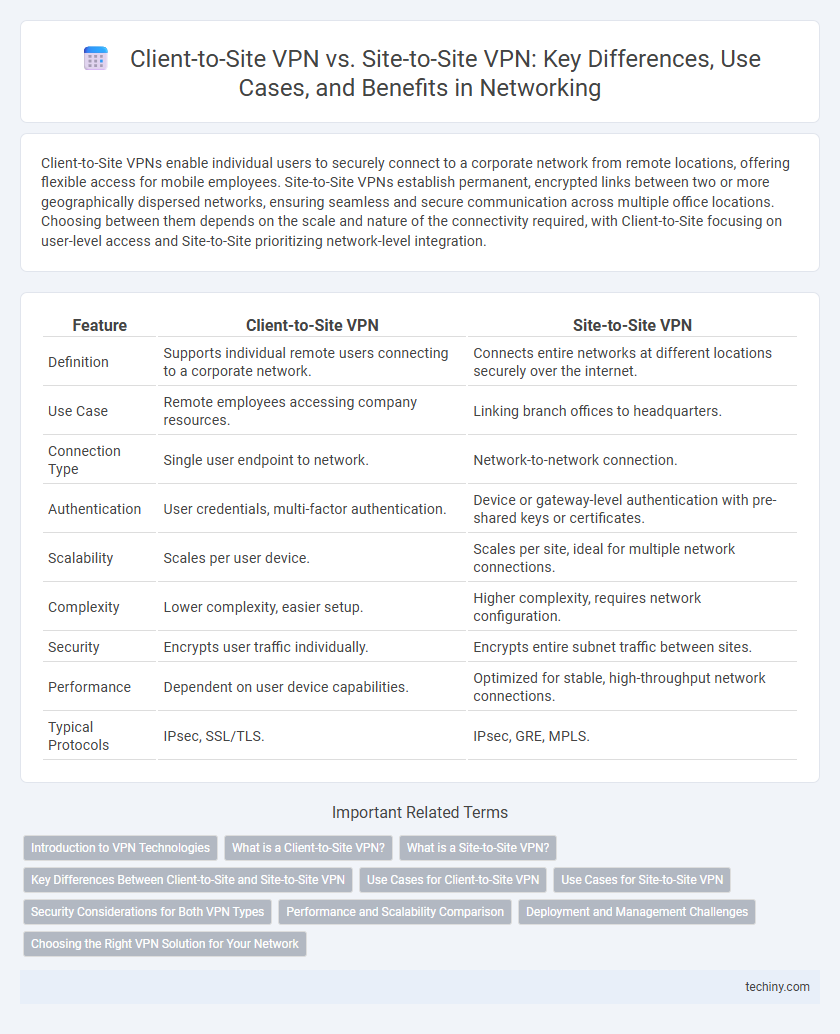Client-to-Site VPNs enable individual users to securely connect to a corporate network from remote locations, offering flexible access for mobile employees. Site-to-Site VPNs establish permanent, encrypted links between two or more geographically dispersed networks, ensuring seamless and secure communication across multiple office locations. Choosing between them depends on the scale and nature of the connectivity required, with Client-to-Site focusing on user-level access and Site-to-Site prioritizing network-level integration.
Table of Comparison
| Feature | Client-to-Site VPN | Site-to-Site VPN |
|---|---|---|
| Definition | Supports individual remote users connecting to a corporate network. | Connects entire networks at different locations securely over the internet. |
| Use Case | Remote employees accessing company resources. | Linking branch offices to headquarters. |
| Connection Type | Single user endpoint to network. | Network-to-network connection. |
| Authentication | User credentials, multi-factor authentication. | Device or gateway-level authentication with pre-shared keys or certificates. |
| Scalability | Scales per user device. | Scales per site, ideal for multiple network connections. |
| Complexity | Lower complexity, easier setup. | Higher complexity, requires network configuration. |
| Security | Encrypts user traffic individually. | Encrypts entire subnet traffic between sites. |
| Performance | Dependent on user device capabilities. | Optimized for stable, high-throughput network connections. |
| Typical Protocols | IPsec, SSL/TLS. | IPsec, GRE, MPLS. |
Introduction to VPN Technologies
Client-to-Site VPN connects individual devices securely to a remote network, enabling remote workers to access internal resources as if physically present. Site-to-Site VPN links entire networks across multiple locations, facilitating secure communication between branch offices through encrypted tunnels. Both VPN types employ protocols like IPsec and SSL to ensure data confidentiality and integrity across public networks.
What is a Client-to-Site VPN?
A Client-to-Site VPN enables individual devices to securely connect to a remote network, providing encrypted access through a VPN client software. This type of VPN is often used by remote workers to access corporate resources as if they were physically on-site. It differs from Site-to-Site VPNs by establishing connections per user rather than linking entire networks.
What is a Site-to-Site VPN?
Site-to-Site VPN establishes secure connections between entire networks over the internet, enabling different office locations to communicate as if they share a single local network. It uses IPsec or similar protocols to encrypt data traffic between gateways or routers at each site, ensuring confidentiality and integrity. This VPN type is ideal for businesses needing reliable and continuous inter-site connectivity without requiring individual client configurations.
Key Differences Between Client-to-Site and Site-to-Site VPN
Client-to-Site VPN enables individual devices to securely connect to a remote network, providing encrypted access for single users, often used for remote work scenarios. Site-to-Site VPN establishes a secure connection between entire networks at different locations, allowing seamless communication and resource sharing across offices. The key difference lies in Client-to-Site VPN supporting user-level access, while Site-to-Site VPN facilitates network-level connectivity between multiple sites.
Use Cases for Client-to-Site VPN
Client-to-Site VPNs enable remote individual users to securely connect to a corporate network, providing encrypted access for telecommuting, business travel, and remote work scenarios. This VPN type suits mobile employees requiring protected access to internal resources such as databases, applications, and files without exposing the entire network. Client-to-Site VPNs support flexible network access, enhance data privacy, and ensure compliance with organizational security policies for offsite users.
Use Cases for Site-to-Site VPN
Site-to-Site VPNs are ideal for securely connecting multiple fixed office locations within an organization, enabling seamless communication and data sharing across geographically dispersed sites. They support constant and encrypted communication channels between branch offices, data centers, and cloud environments without requiring individual client configurations. This VPN type ensures centralized network management and improved performance for business operations that demand reliable and persistent inter-site connectivity.
Security Considerations for Both VPN Types
Client-to-Site VPNs secure remote user connections through strong authentication methods and encrypted tunnels, reducing the risk of unauthorized access. Site-to-Site VPNs emphasize network-to-network encryption, ensuring secure data transmission between fixed locations while maintaining strict firewall policies to mitigate threats. Both VPN types require continuous monitoring and updated security protocols to protect against evolving cyberattacks and vulnerabilities.
Performance and Scalability Comparison
Client-to-Site VPNs typically offer lower performance and limited scalability as they rely on individual user connections, which can create bottlenecks and increased latency with numerous remote clients. Site-to-Site VPNs provide higher performance and better scalability by establishing dedicated, encrypted tunnels between entire networks, efficiently handling large volumes of traffic and multiple endpoints. Enterprises requiring robust, scalable connectivity for numerous users often prefer Site-to-Site VPNs to optimize throughput and maintain consistent network performance.
Deployment and Management Challenges
Client-to-Site VPN deployment requires configuring individual devices and user authentication, posing scalability challenges as the user base grows, while Site-to-Site VPN involves connecting entire networks through gateway devices, simplifying management but demanding complex initial setup. Managing Client-to-Site VPNs often involves frequent updates and troubleshooting on numerous endpoints, whereas Site-to-Site VPNs centralize maintenance with fewer points of failure but require robust network infrastructure and consistent monitoring. Security policies for Client-to-Site VPN must address diverse device environments, contrasting with Site-to-Site VPNs that facilitate uniform policy enforcement across connected networks.
Choosing the Right VPN Solution for Your Network
Client-to-Site VPNs provide secure remote access for individual users connecting from various locations, ideal for telecommuters or mobile employees requiring encrypted access to corporate resources. Site-to-Site VPNs establish encrypted tunnels between entire networks, facilitating seamless data exchange between multiple office locations or branch networks with consistent security policies. Selecting the right VPN depends on network architecture, user access needs, scalability requirements, and the level of control needed over connections.
Client-to-Site VPN vs Site-to-Site VPN Infographic

 techiny.com
techiny.com